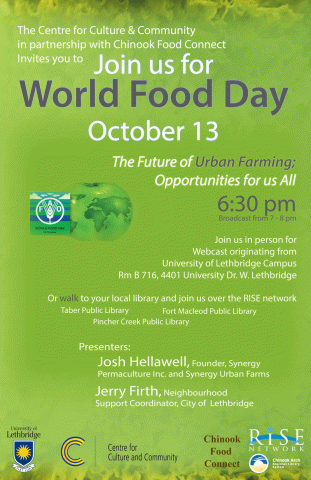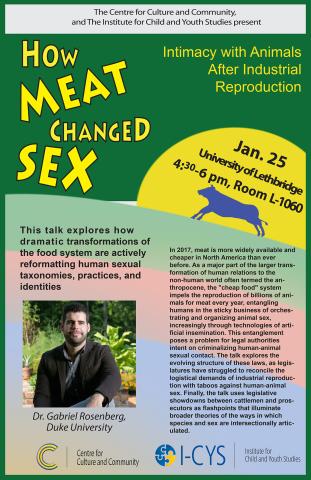Presentations

Presentations that were hosted by the Centre for Culture and Community

World Food Day, The Future of Urban Farming, Opportunities for us All, October 13, 2016
- Josh Hellawell, Founder, Synergy Permaculture Inc
- Jerry Firth, Neighbourhood Support Coordinator, City of Lethbridge
On the occasion of World Food Day, the Centre for Culture and Community sponsored this talk and video teleconference on urban agriculture. Josh Hellawell reported on the operations of urban farms within the city, the processes involved, the harvest size and potentials for the providing of food security. Jerry Firth discussed the impact, scope, and growth of community garden spaces within the City of Lethbridge. He discussed the social and cohesive benefits as well as those of food security. Participant discussion included questions from viewers in the RISE network.
Racism Post Conflict; Reflections on the Japanese-Canadian Experience

- Dr. George Takashima,
- December 7, 2017
Dr. Takashima, a survivor of internment in Canada during World War II discusses the experiences of Japanese-Canadians experience of racism, inclusion, and multiculturalism. This talk was given at the invitation of the CCC on the 75th anniversary of the bombing of Pearl Harbor as that event fueled repression of Japanese Canadians. Because of the unique and historic significance of Dr. Takashina's talk, a video can be accessed through the resources page of this web site, and a pdf transcription may be obtained by email request to the site administrator.
"(We) want to know about the lessons we can learn from that which apply to today. That's important, because, there’s an awful lot of rhetoric language, and, hopefully, not actions that are sort of resonant to what happened then, the targeting different groups." (Susan A. McDaniel, Moderator)
" Now, in the Japanese culture, to this day, there's two words you need to know. One is called, Shikata ga nai, it can't be helped, what's done is done, what's said is said, we move on. That's a philosophy that the Japanese in Japan. The other is Ganbatte or Ganbaru, to persevere. Those were the two things that the Japanese had to come to Canada and continued to have these two things as they faced a thing called racism in British Columbia...." (Takashima, 2016, December 6. Racism post conflict; Reflections on the Japanese Canadian Experience, University of Lethbridge, transcript).
Breeding the Future: 4H and the Intimate State in Rural America, 1900-1950

- Gabriel Rosenberg, Duke University
- January 24, 2017
This talk examines the early history of 4-H, the United States Department of Agriculture’s iconic rural youth organization....The modern 4-H farm, according to 4-H organizers, featured gender-appropriate divisions of labor and produced healthy, robust children well suited for life in a modern countryside. By midcentury, the vision of healthy, heterosexual 4-H'ers laboring on family farms advertised the attractiveness of the emerging agribusiness economy, and anchored the USDA’s authority to new ideas about normal farms, families, and sexuality.
How Meat Changed Sex; Intimacy with Animals after Industrial Reproduction

- Gabriel Rosenberg, Duke University
- January 25, 2017
This talk explores how dramatic transformations of the food system are actively reformatting human sexual taxonomies, practices, and identities. In 2017, meat is more widely available and cheaper in North America than ever before. As a major part of the larger transformation of human relations to the non-human world often termed the Anthropocene, the "cheap food" system impels the reproduction of billions of animals for meat every year, entangling humans in the sticky business of orchestrating and organizing animal sex, increasingly through technologies of artificial insemination. This entanglement poses a problem for legal authority’s intent on criminalizing human-animal sexual contact. The talk explores the evolving structure of these laws, as legislatures have struggled to reconcile the logistical demands of industrial reproduction with taboos against human-animal sex.
Our Use: South Saskatchewan Regional Plan Compliance: Implications and Considerations for Food Security
- Perry Stein, Community Planner, City of Lethbridge Image

Perry Stien, the Community Planner from City of Lethbridge, along with Kathleen Sheppard of Environment Lethbridge will be speaking at an event co-hosted by Chinook Food Connect and the Centre for Culture and Community at the University of Lethbridge. The talks will center on the South Saskatchewan Regional Plan, environmental planning and how these interact with local food security.
